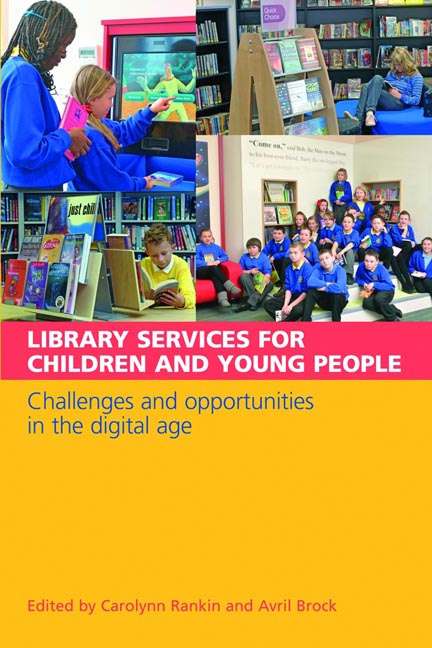Book contents
- Frontmatter
- Dedication
- Contents
- Contributors
- Foreword
- Acknowledgements
- Introduction and vision for the book
- Part 1 Children's library services – policy, people and partnerships
- 1 Library services for children and young people – an overview of current provision, future trends and challenges
- 2 21st-century school libraries – visionary spaces for learning
- 3 The changing shape of reading – the 21st-century challenge
- 4 Case study. Engaging and influencing policy and the curriculum – the Scottish Information Literacy Project experience
- Part 2 Connecting and engaging – reaching your audience and catching the latest wave
- Part 3 Buildings, design and spaces – libraries for children and young people
- Part 4 Issues for professional practice
- Index
2 - 21st-century school libraries – visionary spaces for learning
from Part 1 - Children's library services – policy, people and partnerships
Published online by Cambridge University Press: 08 June 2018
- Frontmatter
- Dedication
- Contents
- Contributors
- Foreword
- Acknowledgements
- Introduction and vision for the book
- Part 1 Children's library services – policy, people and partnerships
- 1 Library services for children and young people – an overview of current provision, future trends and challenges
- 2 21st-century school libraries – visionary spaces for learning
- 3 The changing shape of reading – the 21st-century challenge
- 4 Case study. Engaging and influencing policy and the curriculum – the Scottish Information Literacy Project experience
- Part 2 Connecting and engaging – reaching your audience and catching the latest wave
- Part 3 Buildings, design and spaces – libraries for children and young people
- Part 4 Issues for professional practice
- Index
Summary
Introduction
In the 21st century, schools in the UK are going through a huge process of change. There are enormous challenges, in terms of the changes to the curriculum and the impact of the financial recession on resources. There are societal changes that the school – and the library, at its heart – must be able to respond to. The impact of Google, and all the online resources that we use daily, are particularly felt, when budgetary constraints mean savings are inevitable. The library, with its vital but often difficult to prove impact, can seem a luxury. This chapter will discuss how in the 21st century the school library is not a luxury, but a necessity: the bedrock, the head and heart of all learning, offering a place of both relaxation and stimulation in the school setting and in the wider community as a whole.
The 21st-century vision for schools, taken from Building Schools for the Future (a UK Government investment programme in secondary school buildings in England) (DfES, 2003), is that:
Schools should inspire learning. They should nurture every pupil and member of staff. They should be a source of pride and a practical resource for the community. They will offer a safe, secure, inclusive and comfortable environment … with improved areas such as dining areas, libraries and entrances and better accessibility and facilities for non-pupil users of the school.
And, as Professor Stephen Heppell (2010), a leader in the fields of learning, new media and technology, stated:
The school library is incredibly important – much more so than in the past. It's a place where everyone comes to share and learn. The evidence continues to accumulate that libraries – and their librarians – lie absolutely at the heart of 3rd millennium learning organisations: a place for scholarship, a place to escape into adventures, a place of discovery, a place to share and explore, a place for deep thought, a place for surprise, and above all else a place absolutely without limits. The best schools have libraries at their centres not as some sad throwback to an earlier age but as a clear and evocative prototype of what ambitious learning might look like in this century of learning.
- Type
- Chapter
- Information
- Library Services for Children and Young PeopleChallenges and opportunities in the digital age, pp. 29 - 38Publisher: FacetPrint publication year: 2012



